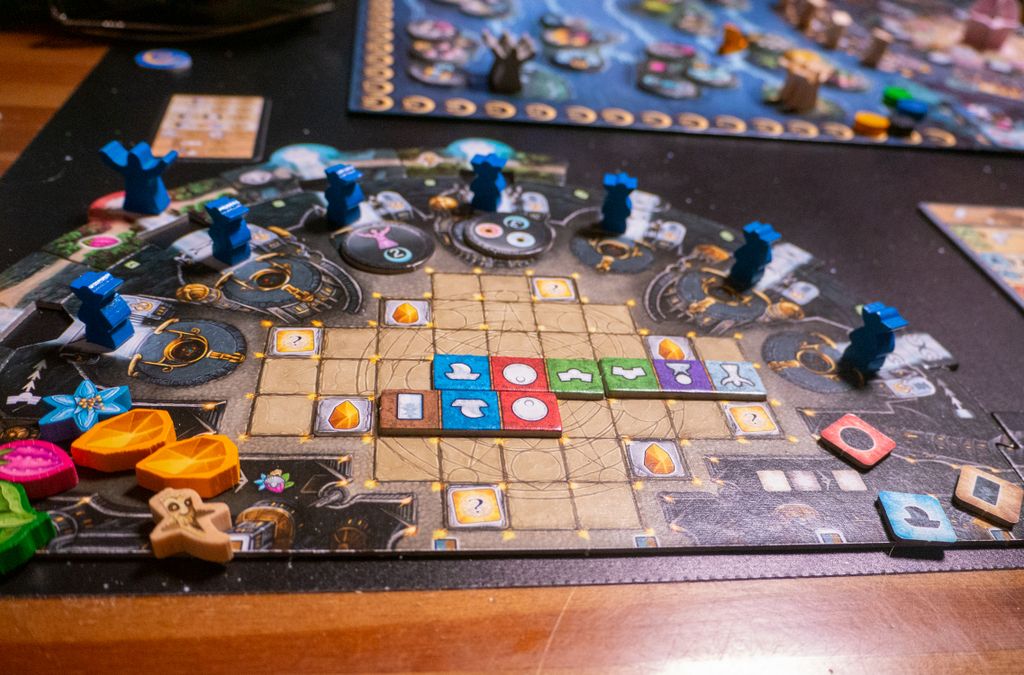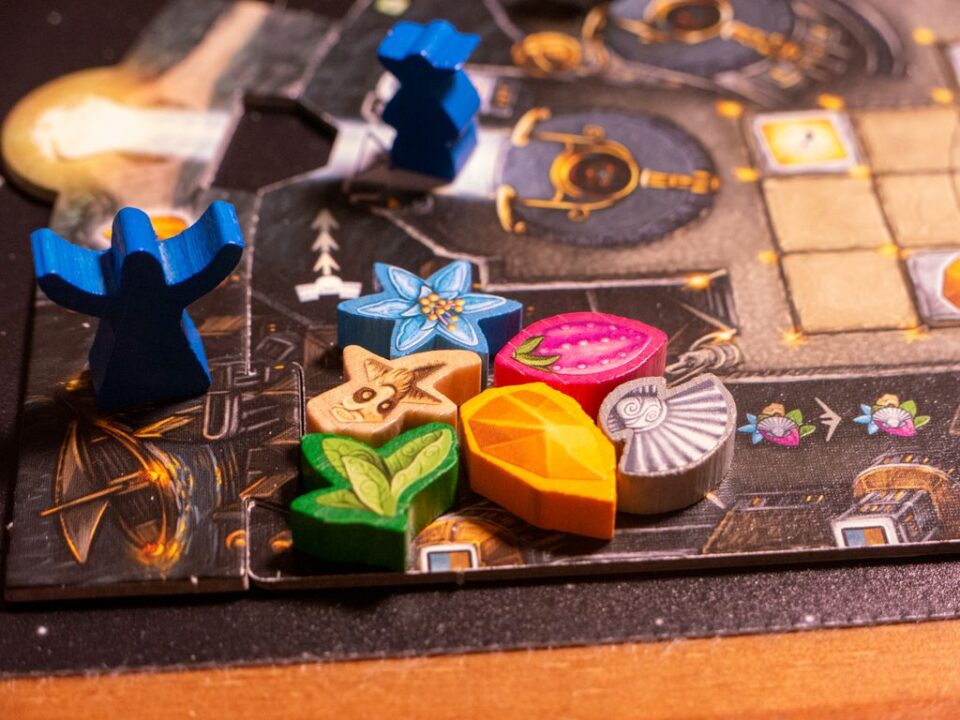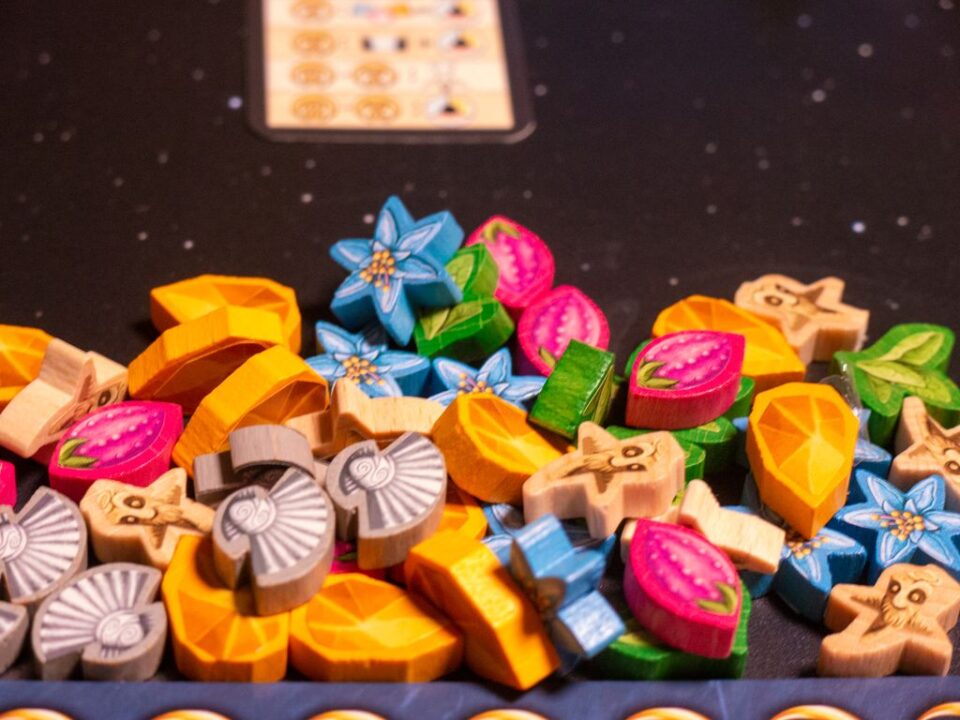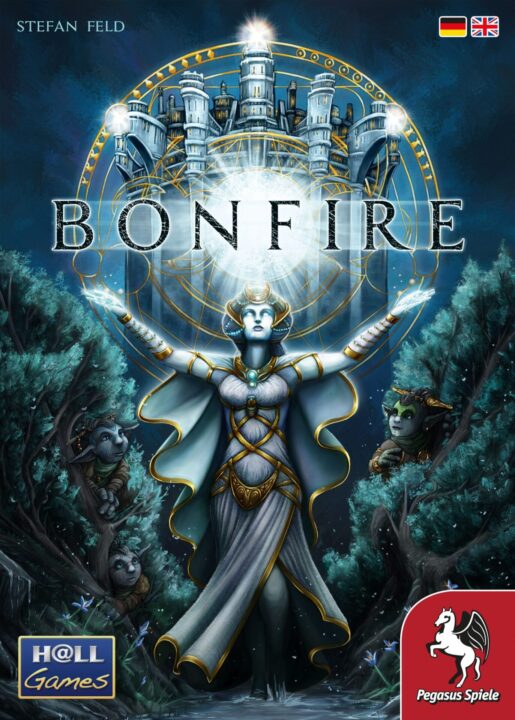Overview
Welcome to this intricate dance of strategy and social engagement, as laid out in our review of Bonfire. Directing the flames of enterprise through its innovative gameplay mechanics, this board game manages to brilliantly spotlight the sync of cognitive challenge with a lighthearted spirit. The intricate complexities woven into the fabric of its design illuminate a realm where tactical foresight meets a lively camaraderie among players. Stay with us as we delve deeper into its fiery recesses.
How It Plays
In ‘Bonfire’, players become gnomish tribes looking to reignite bonfires to gain the favor of the Guardians, a spiritual theme at the core of this rich strategy game. With its challenging gameplay and a focus on strategic maneuvering, the mechanics entertain and provoke strategic planning.
Setting up
To set up the game, players will populate their individual boards with action tiles and bonfires, place the Guardians around the central bonfire, and sort various tokens and resources they will manage throughout the game. Each player will receive a ship and a starting number of action tokens key for acquiring resources and completing tasks.
Gameplay
During gameplay, participants take turns to carry out actions that include moving their ship, drawing task cards, collecting resources, accessing opportunities on the central board, and reigniting bonfires. Strategic tile placement is critical here to forming chains of actions that enable more powerful moves in later turns.
Winning the Game
The purpose of the mind-stretching endeavor is to accumulate most points, which can be earned through various means like completing tasks, pleasing Guardians, or mastering complex resource management and guild dynamics. Anticipating opponent’s moves and adaptively planning your strategy is key to victory in ‘Bonfire’.
Want to know more? Read our extensive strategy guide for Bonfire.
Mastering the Puzzle of Stones
In the heart of Bonfire, an intricate and strategic tile placement system awaits. Players must use wit and foresight as they lay out path tiles to summon Guardians. The success of these endeavors heavily relies on how well one can anticipate and maneuver within this core mechanic. Indeed, seamless integration of path tiles can propel a player towards victory.
Evolving Tactics with Each Play
As the game evolves, so too must your strategy. The adaptability within Bonfire comes to the forefront here. Careful consideration is warranted, given that laying a tile may unlock a multitude of actions—a careful dance balancing immediate needs against future gains. It certainly adds a layer of depth that any seasoned gamer would relish, ensuring no two games are ever the same.
Engaging Social Dynamic
Transitioning from solitary contemplation, the tile placement system also heightens player interaction. While you’re primarily constructing your own realm of tiles within Bonfire, observing and occasionally disrupting opponents’ grids can’t be overlooked. This balance between solitary puzzle solving and interactive gameplay strikes a compelling chord, one that I appreciated repeatedly during my sessions. This dynamic is a key component of any Bonfire review.
Next, delve into the richness of the Resource Management Complexity, where the strategic layers of Bonfire deepen further.

The Intricacies of Resource Allocation
Resource management in Bonfire is a nuanced beast. Firstly, let’s dive into Efficient Utilization. Players must astutely juggle tasks, flipping them at critical moments to maximize their gains. It’s not simply a matter of collecting; it’s a matter of utilizing. It’s a dance of timing, thoughtfulness, and foresight. Further into the game, Scalability and Adaptation becomes paramount. The resources you coveted in the early game might not serve you as well later on. This shifts strategy substantially. Mastering this complexity isn’t easy but overcoming this hurdle is incredibly rewarding. Surely the Minstrels will sing tales of your prowess! And just when you think you’ve got it all figured out, how you utilize these resources in interactions with the varied guilds will truly test your planning and strategy.
Let us now turn the page to the captivating world of Guilds Interaction Dynamics, where social intrigue and alliances await.

A Symphony of Guilds’ Intrigue
In any review of Bonfire, particularly emphasizing its orchestration of player interaction, the Guilds Interaction Dynamics are a crescendo of engagement. Now, Visualize sitting around the table; the air is thick with anticipation. Each player represents a guild, each move is a careful para on strategy’s chessboard. Firstly, these guilds form a mosaic of choices coordinating player’s approaches and intertwining destinies, thanks pivotal to the core experience Bonfire offers.
Clever Alliances and Political Maneuvering
Secondly, let’s consider the poignant significance of connection. This isn’t a game about isolation; the Guilds demand players anticipate and react not just to the state of play but to opponents’ ambitions, conjuring a metagame filled with alliance-building and political savvy. A truly immersive system pulsing at the heart of Bonfire’s capability to catalyze memorable nights.
Engagement through Competition
Moreover, Guilds’ interactivity pieces together fabric forces you to engage not passively, but as an active challenger competing for influence, resources, and power. This intricate dance among guilds glorifies the social interplay that board games like Bonfire so uniquely foster.
In concluding, Bonfire’s review wouldn’t be complete without acknowledging the sophisticated intricacy the Guilds Interaction Dynamics brings to the tabletop. It elevates Bonfire from being simply a game to a portrayal of a dynamic, cerebral challenge that I wholeheartedly recommend.

Conclusion
In wrapping up this review of Bonfire, it’s clear that this game offers an intricate blend of strategic tile placement that demands players to constantly adapt their strategies in response to their opponents’ actions. The resource management aspect of the game introduces a satisfying complexity, as every choice can tip the scales for winning or losing, striking a robust balance between planning acumen and opportunity cost assessments. Moreover, the Guilds Interaction Dynamics add a unique social dimension, as players must navigate alliances and rivalries to advance their agendas, making for an extremely engaging game night. Finally, despite the weight of its complexity, or perhaps because of it, Bonfire stands as an exemplary board game that promises a challenging but rewarding experience for those who venture into its strategically rich flames. Whether you are a seasoned veteran of strategy games or an enthusiastic newcomer, Bonfire is tremendously likely to light a fire in your board gamer’s heart. I highly recommend giving it a try for an enlighteningly fiery evening of gameplay.


